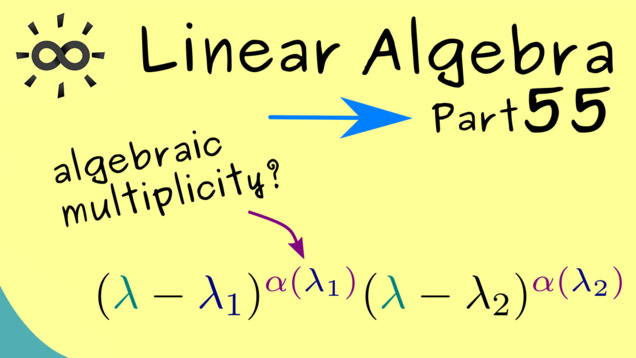
-
Title: Algebraic Multiplicity
-
Series: Linear Algebra
-
Chapter: Eigenvalues and similar things
-
YouTube-Title: Linear Algebra 55 | Algebraic Multiplicity
-
Bright video: https://youtu.be/AZgx-SUvioc
-
Dark video: https://youtu.be/kVFlpNUqC40
-
Quiz: Test your knowledge
-
Dark-PDF: Download PDF version of the dark video
-
Print-PDF: Download printable PDF version
-
Thumbnail (bright): Download PNG
-
Thumbnail (dark): Download PNG
-
Subtitle on GitHub: la55_sub_eng.srt missing
-
Timestamps (n/a)
-
Subtitle in English (n/a)
-
Quiz Content
Q1: Let $A \in \mathbb{R}^{3 \times 3}$ be a square matrix with $$ A = \begin{pmatrix} 2 & 0 & 0 \ 0 & 2 & 0 \ 0 & 0 & 2 \end{pmatrix} $$ What is algebraic multiplicity of the eigenvalue $2$?
A1: 3
A2: 0
A3: 1
A4: 2
Q2: Let $A \in \mathbb{R}^{n \times n}$ be a square matrix with eigenvalue $2$. What is never possible for the algebraic multiplicity $\alpha(2)$?
A1: $\alpha(2) = n+1$
A2: $\alpha(2) = n$
A3: $\alpha(2) = 1$
A4: $\alpha(2) \in \mathbb{R}$
Q3: Let $A \in \mathbb{R}^{2 \times 2}$ with eigenvalue $5$ and $7$. Which of the following claims for the algebraic multiplicity is the only possible one?
A1: $\alpha(5) = \alpha(7) = 1$
A2: $\alpha(5) + \alpha(7) = 1$
A3: $\alpha(5) + \alpha(7) = 3$
A4: $\alpha(5) = 2$
A5: $\alpha(7) = 0$
-
Last update: 2024-10